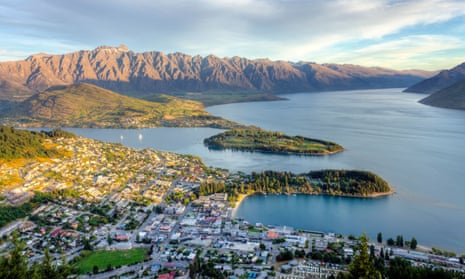The Queenstown waterfront is quieter than normal for mid-February, except for the oncoming hum of the Hydro Attack: a high-speed, shark-shaped semi-submersible, zipping visitors around the bay.
The attraction, billed as “shark meets machine”, takes ticket-holders at up to 80km/h for NZ$155 a pop – and despite a dire year for New Zealand’s tourism industry, business has been better than expected, says operations manager Chris West.
“It’s obviously been a little bit slower … [but] we have far exceeded anything that we thought we were going to be able to pull through.”
At least for now, the Hydro Attack is bucking the broader, bleaker trend in Queenstown, a tourism hotspot where an economic crisis is looming.
From more than a million international visitors in 2019, numbers are down to nearly zero since New Zealand’s borders were closed by Covid-19, forcing many businesses to reduce their services or shut up shop entirely.
Shaun Kelly, owner-operator of the Absoloot Backpackers in Queenstown, says his hostel is operating at 25% occupancy and that he does not expect the outlook to improve for the rest of the year. “In terms of the business environment, to be honest, it’s awful … Any evidence to say that we’re doing OK is wrong.”
Many communities more than a few hours’ drive from major centres – such as the West Coast glacier towns Franz Josef and Fox, Te Anau and Lake Wānaka – are suffering the same pressures.
They have been left out of New Zealand’s Covid-19 success story, Kelly says. “It would make a huge difference if central government would acknowledge that there are industries that haven’t recovered.”
In a meeting with Queenstown Lakes mayor Jim Boult on Tuesday, the government ruled out reinstating the wage subsidy that kept the sector afloat during the seven-week lockdown last year. Boult said the news would have been a “bitter pill” for those in the industry holding out for a lifeline.
Now a new report is calling on the government to take advantage of the absence of tourists to overhaul the sector and cut subsidies.
The parliamentary commissioner for the environment, Simon Upton, is urging the government to act on the looming issue of over-tourism in New Zealand that he warned of last year while the border remains closed.
In a report tabled in Parliament on Thursday, Upton made policy recommendations to transition “to a form of tourism that is less environmentally harmful – and more resilient”.
These included introducing a departure tax for all travellers leaving New Zealand (including citizens) to reflect the emissions generated by international travel; and making government funding for tourism infrastructure conditional on meeting environmental criteria and iwi consultation.
The commissioner’s report recommended an essential change to the tourism model, saying the industry needed to “set aside the language of marketing” and the government needed to treat tourism “the same as any other sector of the economy”.
Singling out support for the sector in the wake of Covid-19, Upton acknowledged that businesses were suffering but said “there is broad support for the idea that protecting tourism livelihoods in the short term should not morph into a slow but inexorable return to the status quo in the long term.”
ProfRegina Scheyvens, an expert in development studies at Massey University, welcomed the commissioner’s proposals, in particular the recommendation that the departure tax be used to support green initiatives in the Pacific islands, which are bearing the brunt of the impacts of climate change.
Questioning the support and subsidies for tourism may be unpopular, Scheyvens said – “but given that the industry has been growth-focused for so long and the natural environment has borne the brunt of negative impacts of this growth, these questions need to be asked.”
By resolving to approach tourism through a sustainability lens “we’ll be protecting our natural capital, and the reputation of our tourism industry, now and into the future”, she said.
René de Monchy, the interim chief executive of Tourism New Zealand, said it would consider the commissioner’s recommendations alongside other agencies and that work was already under way to improve the sector.
“Tourism of the future needs to give back more than it takes. We want that, the industry wants that and most importantly New Zealanders want that,” he said. “The Covid pandemic has given New Zealand an opportunity to create a tourism system that enriches our home.”
Struggling business owners may feel otherwise.
In Queenstown, Kelly said the sector was being unfairly singled out for its environmental toll. “I’d question why we’re now taking this concept against an industry that is suffering when there are even larger contributors out there … As an accommodation provider, we personally strive to achieve sustainable practice where we can.”
Kelly suggested that investment, for example in long-distance train links and public transport, could help to ease the burden of tourists on New Zealand.
He added that the tourism minister Stuart Nash’s stated preference for wealthy visitors, once borders reopen, might be at odds with the commissioner’s recommendations. “A high-value tourist coming over on a private jet, taking private helicopters – one has to suggest that doesn’t coincide with any sustainable practice.”
At the Hydro Attack kiosk, West said the business’s owners did what they could to minimise their environmental footprint (and their noise pollution).
“We realise that we’re, obviously, burning through petrol and on the lake and things like that – but we think, in general, we’re trying to do our best.”
